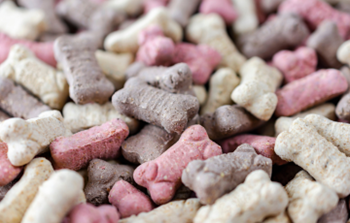Why Food Safety Isn’t Just for Humans
More pet food companies seek SQF certification to mitigate risks.
 The terms “pet parents” and “humanization of pets” that have emerged in recent years are a testament to changing attitudes about the roles that animals play within the family home and dynamic. A 2023 consumer survey from Vericast found that more than three-quarters of pet owners view their pet as their child.
The terms “pet parents” and “humanization of pets” that have emerged in recent years are a testament to changing attitudes about the roles that animals play within the family home and dynamic. A 2023 consumer survey from Vericast found that more than three-quarters of pet owners view their pet as their child.
Along with the notion that pets are extended family members of the furry or feathered kind, the uptick in pet ownership during the pandemic and modern hybrid work styles have put a new focus on the quality of pet food. Simply put, more people are spending more time and more care with their pets.
They’re also spending more money. That same survey from Vericast showed that 78% of pet owners were willing to shell out additional dollars for pet foods and treats last year compared to the prior year. Health is intertwined with nutrition, as another survey from Mintel revealed that 61% of pet owners agree that their pet’s well-being is more important than their own.
It’s little wonder, then, that pet parents are taking a closer look at pet foods and treats, and manufacturers are taking their own look at how their products are made and marketed. Interest in pet food safety and quality has risen significantly in recent years and is evident in the growing number of companies that are seeking SQF certification for pet food safety and quality.
By obtaining certification to the SQF code for pet food, manufacturers can protect their products and reputations as the overall market evolves with consumers’ preferences and demands. “It’s an industry that was forgotten for a long time and didn’t really get looked into when it came into food safety and food quality,” says Kris Middleton, food safety business unit manager at Bureau Veritas, a licensed certification body and training center for SQFI that works with makers of both human and pet food.
With consumer-driven market shifts and the introduction of regulations on animal food like those put forth in the Food Safety Modernization Act (FSMA), there is a new impetus on companies to evaluate and validate their respective products for pets. Because SQFI covers both food safety and quality in a food safety management system, it’s an effective, proven way to control risks that are unique to a particular business.
One manufacturer that has prioritized food safety and quality management, including through SQF certification, is Diamond Pet Foods. With six facilities in the U.S. and another set to open soon, the company produces several product lines for dogs and cats.
According to Matt Ryan, food safety director at Diamond Pet Foods, the company first received SQF certification in 2017. “One of the major driving forces was that it was a customer requirement. They wanted to see that level of commitment made to our food safety programs and policies. And then, obviously, we started from there and rolled it out to all of our sites,” he explained, adding that the process taught them a lot about documentation and led to other program development to fill any safety gaps.
Through SQF certification – which also involves senior management – manufacturers like Diamond Pet Foods are able to fuel continuous improvement that ultimately improves their overall business while providing pets with safe, quality nourishment and providing their “parents” with peace of mind.
Implementing SQF guidelines helps pet food manufacturers identify and mitigate potential risks throughout the production process, including hazards related to ingredients, processing, and packaging. Tune in to our most recent episode of the SQF Spotlight as food safety professionals share their insights into using the SQF code in their pet food businesses.
The SQF Food Safety Code: Pet Food Manufacturing, Edition 9 is used by major pet food manufacturers such as Diamond Pet Foods, Fresh Pet, and Sunshine Mills to provide a comprehensive framework for ensuring the safety and quality of their products. SQF certification is recognized globally and demonstrates a commitment to producing safe pet food products.
Recent Blog Posts
SQF Code Edition 10 represents a critical step forward in ensuring rigorous yet practical food safety management across the supply chain.
In an industry where compliance and operational integrity are nonnegotiable, manufacturers and suppliers need more than just certification — they need a globally recognized solution.
Renee McVey is one of the first industry professionals to hold the Safe Quality Food Institute’s new Certified SQF Practitioner credential, which is administered by Exemplar Global.




